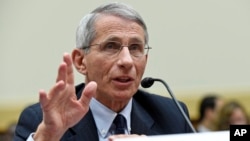As the Ebola epidemic continues to spread unchecked in western Africa, fears are beginning to emerge that the virus could mutate and the disease could become airborne. Some experts say the chances are remote, though, that Ebola could spread from person-to-person through the air.
As the number of people infected with Ebola has soared in Liberia, Sierra Leone, Guinea, Nigeria and Senegal -- with more than half of the estimated 4,300 cases resulting in death -- some infectious disease specialists have expressed concern the disease could acquire a new, more terrifying mode of transmission -- through inhalation, much like the common flu bug.
People become infected with Ebola by coming into contact with the contaminated bodily fluids, primarily blood and saliva, of infected individuals.
Genetic mutations
In a New York Times opinion piece, biosecurity expert Michael T. Osterholm noted that viruses like Ebola are "notoriously sloppy in replicating," which means that each new infection presents the possibility of trillions of genetic changes. Genetic mutations to bacteria and viruses are common. They are the result of small mistakes that occur in the DNA of a microbe in the course of replicating.
But rarely, said Dr. Anthony Fauci, does a virus mutate to the point that it changes how it spreads from person to person.
In testimony Wednesday before a U.S. Congressional committee hearing on Ebola, Fauci, the head of the U.S. Institute of Allergy and Infectious Diseases, commented on that possibility.
“It generally, if it changes a function, modifies an already-existing function, it makes it either a bit more virulent or a bit less virulent. It makes it a little more efficient in the way that it spreads or a little less efficient,” he said.
Tough measures
Having said that, he warned the longer the Ebola epidemic continues in Africa, the greater the chance the virus will acquire mutations.
“If this virus keeps replicating and keeps infecting more and more people, you are going to give it a chance to mutate. So, the way you can take that off the table is to actually shut down this epidemic,” Fauci said.
Experimental drugs have been used in some cases to treat Ebola patients, but care is mostly supportive. In the absence of a cure, efforts continue to try to contain the virus through quarantine, limiting travel to other countries and public curfews.
The United States is sending 3,000 troops to Liberia, the nation worst hit by Ebola, to help with training medical workers, coordinating supplies and building new treatment facilities. Other countries are donating medical supplies to try to contain what one public health official called a “ferocious” epidemic.
Immediate action needed
Kent Brantly, an American missionary doctor who survived the Ebola virus, told a House Foreign Affairs subcommittee on Wednesday, "The longer we wait, the greater the cost of the battle, both in dollars and lives."
The panel on Africa, Global Health, Global Human Rights and International Organizations met to hear how experts at various U.S. public health agencies think the virus can be contained, although one panelist described it as "ferocious and spreading rapidly."
One of the experts warned that Ebola could last for years and spread to many more countries in Africa if it is not controlled quickly.
Fauci also noted that a 13th volunteer received the Ebola vaccine Wednesday, and so far the trials are going well. He said the ZMapp therapeutic treatment that Brantly and others have received still needs to be evaluated to determine how well it works.
Those testifying emphasized the urgency of getting aid to the West African countries experiencing the Ebola outbreak, and that improving the medical structure in these countries is critical to saving lives.
VOA's Carol Pearson contributed to this story.




